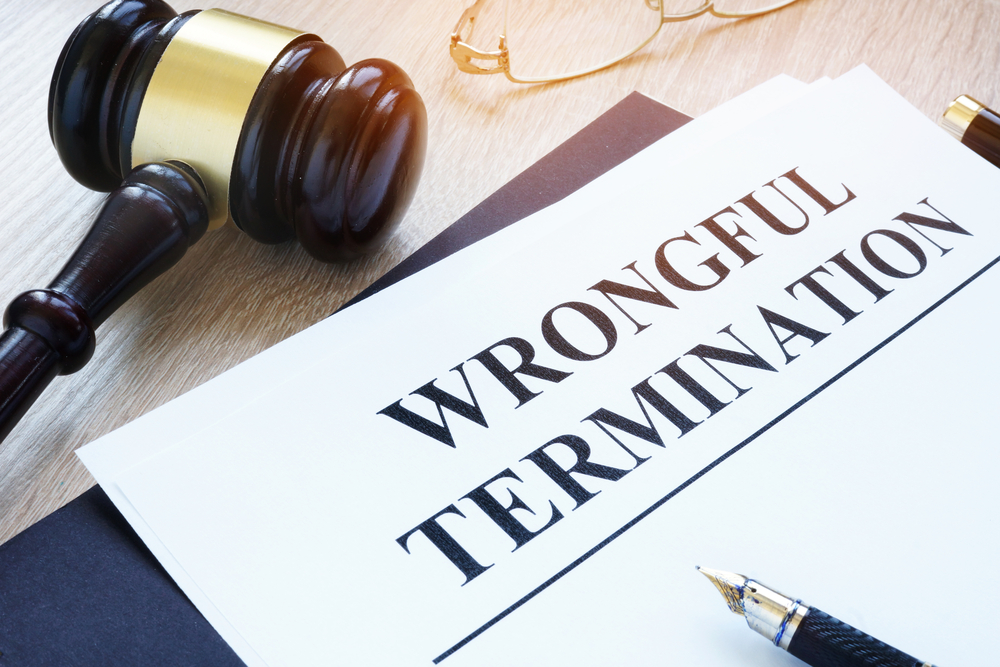 Being fired from your job is an incredibly stressful experience, and it can often leave you feeling angry, frustrated, and helpless. You might be looking for someone to blame, or some kind of compensation for the loss you’ve just experienced. The fact of the matter is that most states operate on an “employment at will” basis, which means an employee can be let go at any time for almost any reason. However, if you feel that you’ve been wrongfully terminated, you actually can sue your employer—if you can prove that you were fired illegally. Here are some questions to ask yourself to determine if you can sue for wrongful termination.
Being fired from your job is an incredibly stressful experience, and it can often leave you feeling angry, frustrated, and helpless. You might be looking for someone to blame, or some kind of compensation for the loss you’ve just experienced. The fact of the matter is that most states operate on an “employment at will” basis, which means an employee can be let go at any time for almost any reason. However, if you feel that you’ve been wrongfully terminated, you actually can sue your employer—if you can prove that you were fired illegally. Here are some questions to ask yourself to determine if you can sue for wrongful termination.
Was Discrimination Involved?
It’s illegal to fire someone based on their age, race, ethnicity, gender, religion, sexual orientation, or on any other protected grounds. It’s also illegal to fire someone because they became pregnant during their employment. If you believe you were dismissed for a discriminatory reason, you have grounds to sue. However, you need to be able to prove that your dismissal was based on one of these factors, and not related to other matters.
For example, let’s say you recently “came out” at work as being homosexual. Your boss immediately began to treat you differently, no longer selecting you for special projects, refusing to give you overtime, and so on. Shortly thereafter, you were fired for unspecified reasons. If you can show that there were no changes to your performance at work, the timing of this dismissal, along with the change in your boss’s behavior towards you, are strong grounds for a case of wrongful termination.
Were You a Whistleblower?
Prior to being fired, did you report your employer for workplace health and safety violations or for breaking the law? Were you asked to do something illegal and fired after refusing to do so? If so, then you’re protected under OSHA’s Whistleblower Protection Program. This program protects employees from workplace retaliation when reporting employers for violations. However, even if you didn’t report the violation, and you were fired after expressing concerns over it or after refusing to do something illegal, you can sue for wrongful termination.
Let’s say your supervisor brought you a contract signed by a client and asked you to change the date written on the contract, then make them a new copy. Altering the contract would be illegal, and so you refused to do it; you may have even questioned your supervisor as to why contracts were being altered. The next day, you were fired.
If you find yourself in this kind of situation, you have a case for wrongful termination. Not only can you sue for your dismissal, but your employer can also face significant repercussions for asking employees to do something illegal.
Did Your Employer Violate Your Contract?
Jobs often require you to adapt to changing demands in the work place. However, if your employer changed a fundamental term of your employment contract, then fired you when you refused to accept those changes, you’ve been wrongfully terminated. Examples of changes that violate your employment contract include:
As an example, let’s say you were hired as a customer support representative, and your duties were to answer calls from clients needing help with the product. However, after a few months of this, your employer told you that you needed to start making cold calls to clients to push for upsells. This was not a part of the duties you agreed to perform, and if you’re not comfortable with this change, you might refuse to do it. If you’re fired for doing so, you could have ground for wrongful termination.
Please note that, if your employer makes these kinds of changes, and you go along with them for a time, this could be seen as you accepting the changes to your employment contract. This would reduce the likelihood of a successful case.
Did You Resign Under Duress?
Finally, if you resigned from your job, but felt you were forced into it, you may still have grounds for termination. Resigning from your job usually means that you don’t receive severance pay, so resigning under duress can be a double blow to employees. If you felt bullied, pressured, or blackmailed into resigning, seek legal advice immediately.
Proving wrongful termination can be tricky, but our team of legal experts are here to help. Contact us to schedule a consultation. We’ll go over your case and help you to determine if you have grounds to sue. Call now!